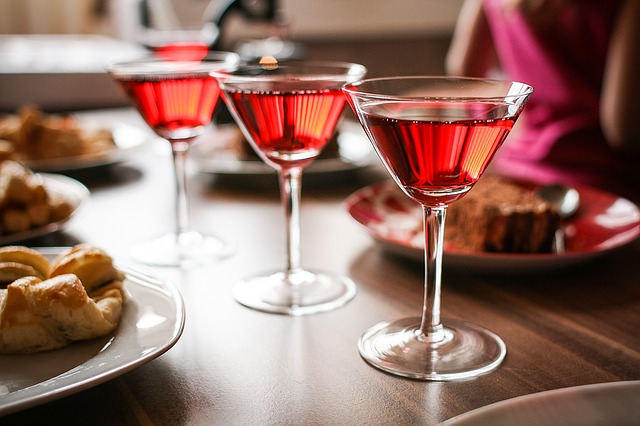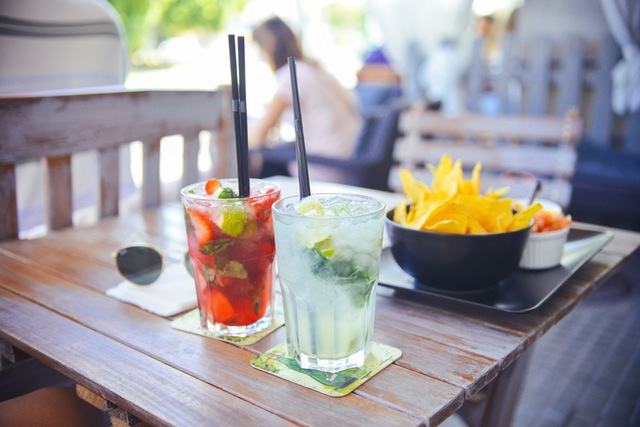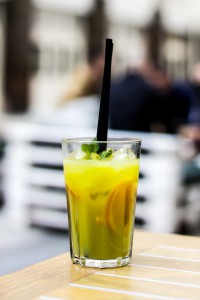Four Alcohol-Related Concepts You May Struggle To Express In Russian Posted by Maria on Mar 2, 2016 in Culture, language, Traditions, when in Russia

What? Struggling to talk about alcohol in Russian? Surely, with the fourth-highest per capita alcohol consumption in Europe, Russia must have developed an extensive booze vocabulary, much like the proverbial, if debunked, words for “snow” in Eskimo languages? Well, yes and no.
1. Shots
You know those small glasses of straight liquor college kids do in bars? Yes, I’m talking about shots, also known as “shooters.” You may be surprised to learn there is no commonly understood, widespread name for them. A shot glass is, of course, сто́пка. But what about the drink itself?
Well, having shots is a relatively new thing in Russia, so most bars that do serve them will call them “шо́ты.” This Russian site even has an explanation of what a shot is. The closest I can think of to a shot is having vodka by the рю́мка (a 50 ml glass). That is usually done at the table, during a meal, and chugging all of your drink at once is optional. Moreover, at least in my family, that was more of a man’s drink.
2. Happy Hour
 Happy hour is another common concept that does not have a universally recognizable name in Russian. As you probably know, happy hour is the time when establishments offer discounts in an effort to entice customers before the normal “rush hour.” The bilingual corpus Linguee lists a few variants for translating it, including “счастли́вый час” and “час ски́док” (literally, “discount hour”).
Happy hour is another common concept that does not have a universally recognizable name in Russian. As you probably know, happy hour is the time when establishments offer discounts in an effort to entice customers before the normal “rush hour.” The bilingual corpus Linguee lists a few variants for translating it, including “счастли́вый час” and “час ски́док” (literally, “discount hour”).
My Internet research has revealed that many Russian bars will use “happy hours” in English and in plural. Perhaps the plural is because the promotion does not last literally one hour?
3. Mixed Drinks
 Now, I know what some of you may be thinking. “But my Russian friends kept having отвёртка (screwdriver), so Russians must know at least some mixed drinks.” That much is true. Some mixed drinks are known in Russia, depending where you are and who you talk to.
Now, I know what some of you may be thinking. “But my Russian friends kept having отвёртка (screwdriver), so Russians must know at least some mixed drinks.” That much is true. Some mixed drinks are known in Russia, depending where you are and who you talk to.
For instance, this bar in Яросла́вль (Yaroslavl) lists лонг-а́йленд (Long Island Iced Tea), мохи́то (mojito), and дайки́ри (daiquiri). However, you cannot assume that any bartender or, much less, any adult, will know what you are talking about if you casually order a White Russian (“Бе́лый ру́сский“? To most people this will sound like we are talking about the White Army after the Russian Revolution).
In general, I find that Russian lacks the detailed vocabulary for alcohol consumption outside the house. For example, I can’t think of a way of saying “well/rail drinks” (mixed drinks made with the cheapest, off-brand liquor) or “call drinks” (drinks made with brand-name liquor).
4. Pre-Gaming
Drinking at home before heading out to a social event is known as pregaming or preloading in English. I was not able to find an established equivalent in Russian. You would probably use a literal description, like “вы́пить пе́ред вы́ходом в свет” (drink before going out). Does that mean that Russians never drink before going out? No. Perhaps they just haven’t done it long enough or often enough to have an agreed-upon name for it.
In other words, while alcohol consumption is high in Russia, consuming largely mixed drinks in establishments outside one’s home is a relatively recent and limited development (we are not talking about Tsarist-era inns, or kabaks). In my experience, Russians tend to drink their alcohol straight, at home, over the course of a meal. Bars and clubs mostly attract a younger, trendy, urban crowd. As a result, Russian doesn’t have a very developed vocabulary for going out to drink. Does this align with your experience? Can you think of any other drinking concepts that don’t have a good description in Russian?

Build vocabulary, practice pronunciation, and more with Transparent Language Online. Available anytime, anywhere, on any device.




Comments:
Mike:
What fun, thanks! Not big on spirits and never liked mixed drinks, so this was a revelation in two languages. Pregaming? Preloading? I feel so old….
Maria:
@Mike Thank you, Mike. I’ve always found it fascinating that Russia is supposed to be a high-context context culture, with a lot of shared experiences and a lot of things left unsaid. The US is supposed to be a low-context culture, with things being explained explicitly. In the case of bar etiquette, however, the US is pretty high-context. You are just supposed to know the drinks and their names, the bartender is supposed to know them, etc.
Nathan:
@Mike I am an American alcoholic who is about to travel to Russia. I’ve been learning very basic russian. What is the best way to express that I cannot have even one drink? For instance, when turning down vodka, I hear Russians will politely offer champagne or beer. My aim is to express that I am honored to be offered a drink, but that, to me, it is poison! Thank you!
Maria:
@Nathan Hi Nathan,
Thank you for your comment. I would suggest “Спасибо, я не пью” (“Thank you, I don’t drink,” pronounced “spuh-SEE-buh YA nee PEW”). If there is insistence, I would explain “Я бросил пить” (YA BRAW-seel PEET, “I’ve quit drinking”). People should be able to understand and respect that, although you have a point in that they may offer something again out of politeness. There is normally a variety of non-alcoholic drinks at Russian gatherings — juices, mineral water, soft drinks, so you will likely have other options.